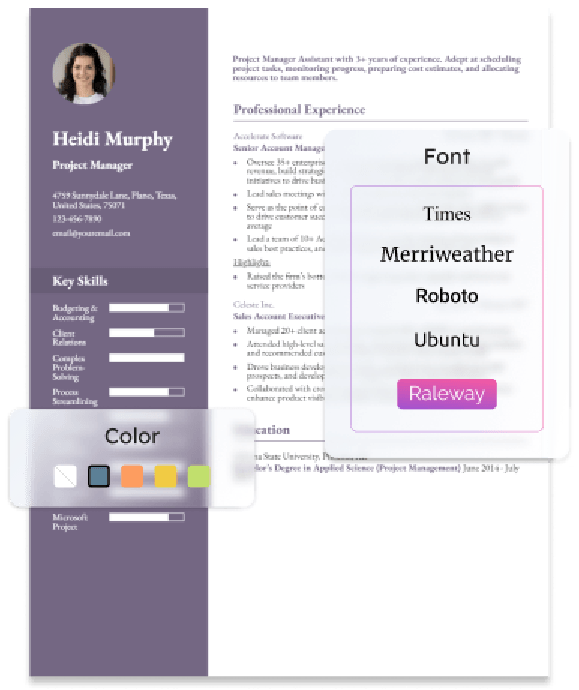As a senior executive, your resume will be much more heavily scrutinized than that of entry-level and mid-career candidates. Companies invest more time and resources into experienced professionals, so craft an accomplishment-driven resume to differentiate yourself from the competition. This guide will provide expert tips to help translate your career experience into an impactful marketing document.
“Executive-level resumes need to tell a story of strategic leadership and measurable success. Emphasize the outcomes you’ve driven, the teams you’ve built, and the vision you’ve executed.”
— Carolyn Kleiman, Resume and Career Advisor
Most Popular Executive Resumes
Vice President Resume
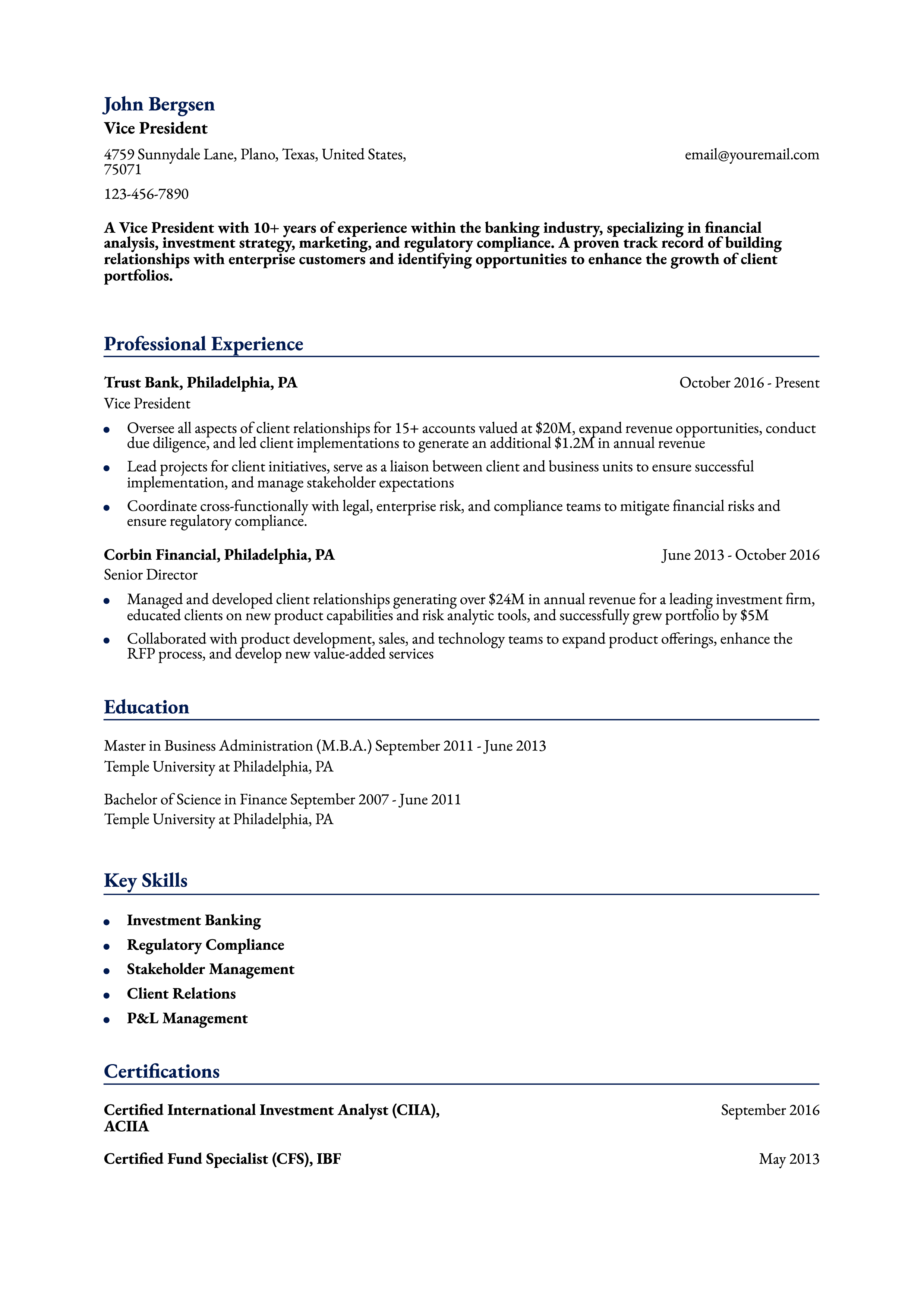
Why this resume is strong:
This resume showcases strong leadership in managing $20 million in client accounts and driving $1.2 million in new revenue. It highlights cross-functional collaboration, regulatory compliance, and growth-oriented strategies.
Technology Executive Resume
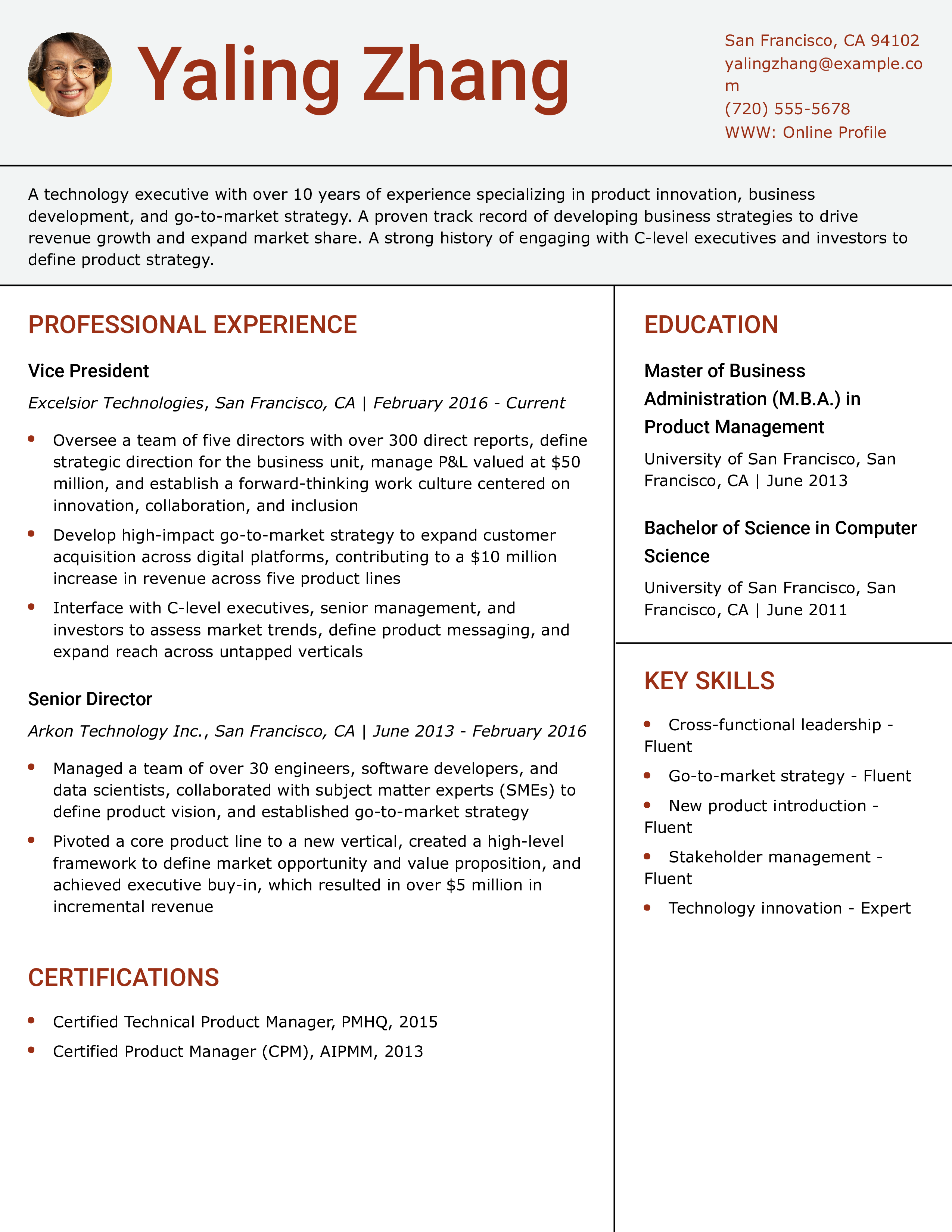
Why this resume is strong:
The resume demonstrates expertise in driving $10 million in revenue through product innovation and go-to-market strategies. Managing a $50 million P&L and leading large teams underscores exceptional leadership and strategic planning skills.
Vice President of Sales Resume
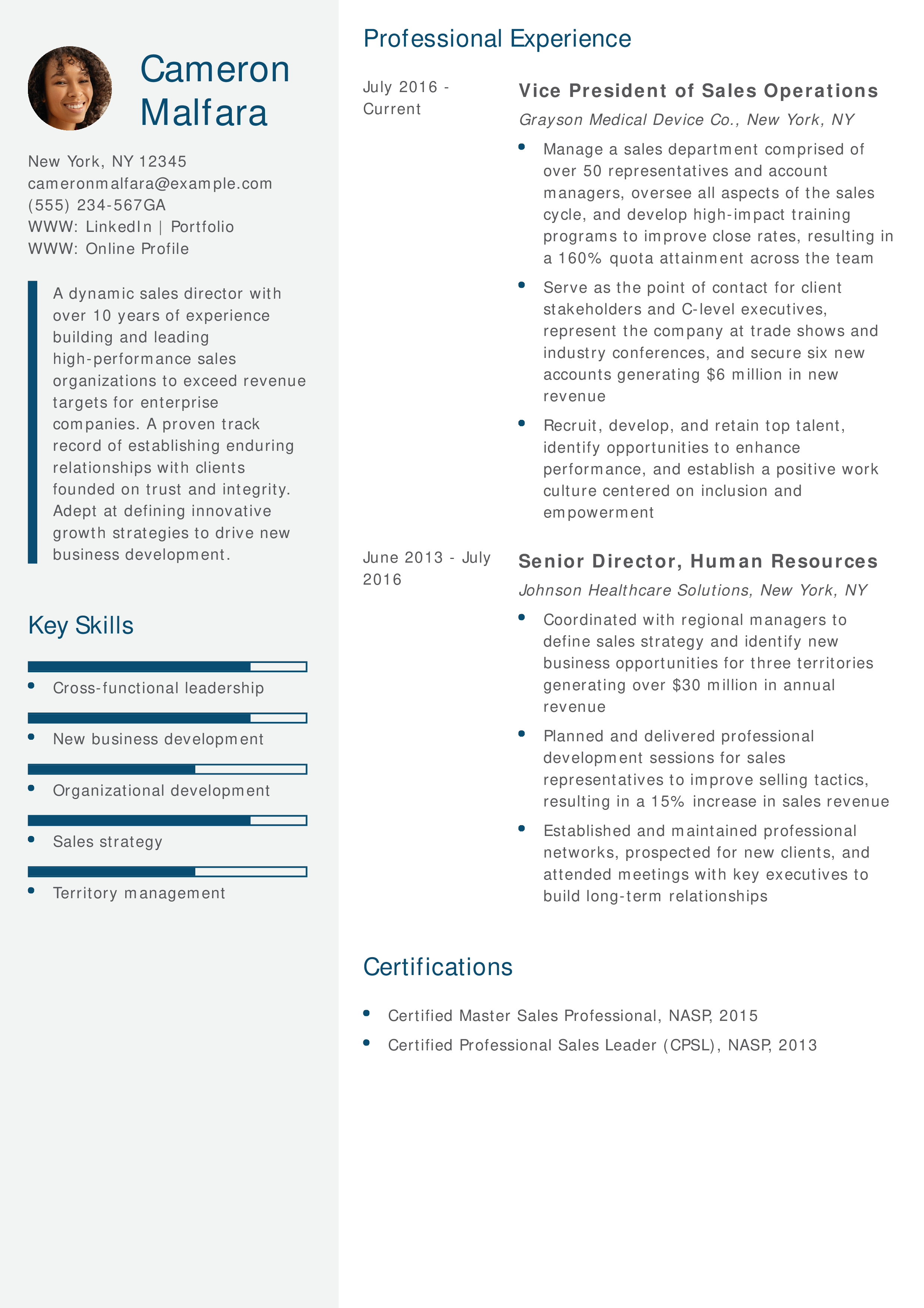
Sales Executive Resume
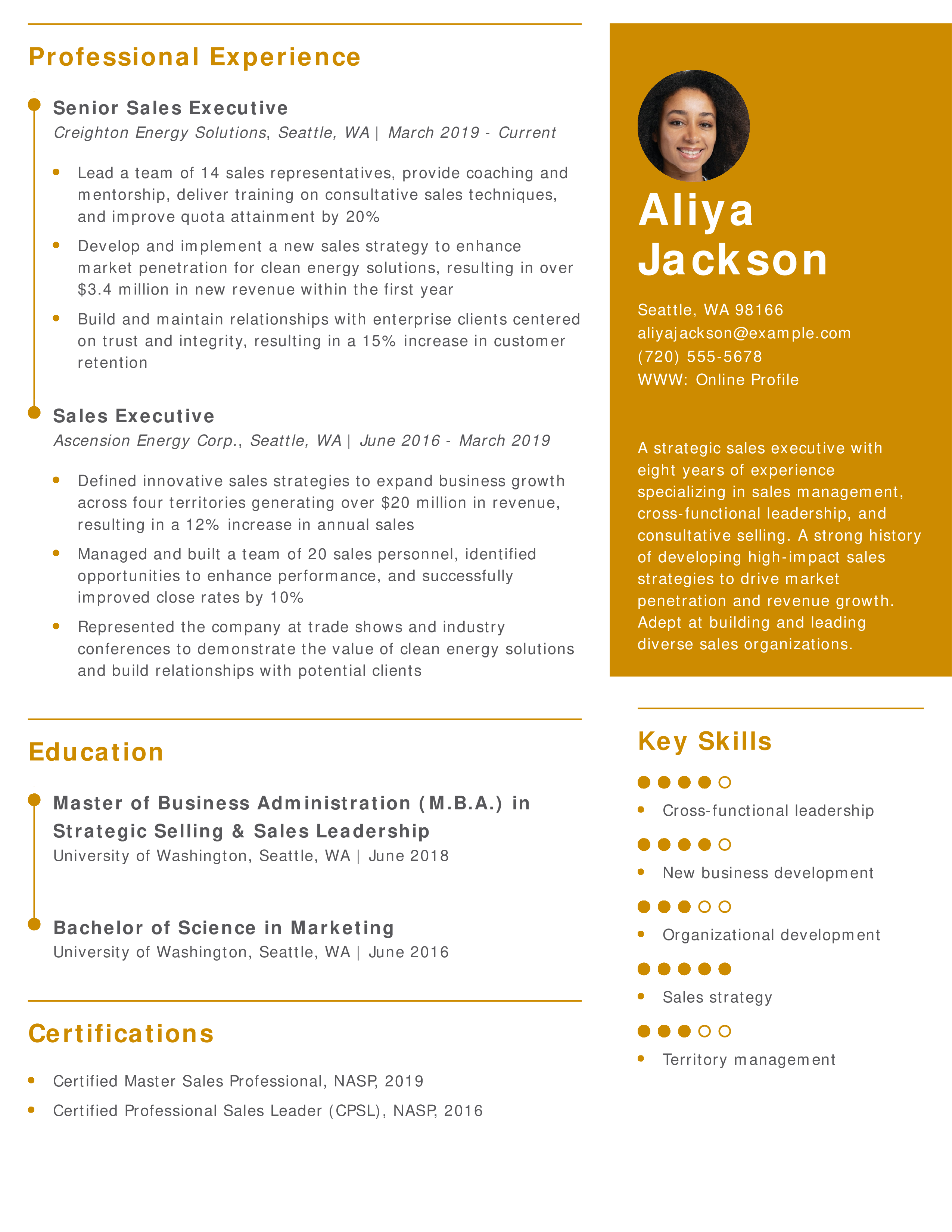
Why this resume is strong:
The resume emphasizes success in leading teams and increasing market penetration, generating $3.4 million in new revenue. It also demonstrates a strong history of customer retention and consultative selling.
Health Care Executive Resume
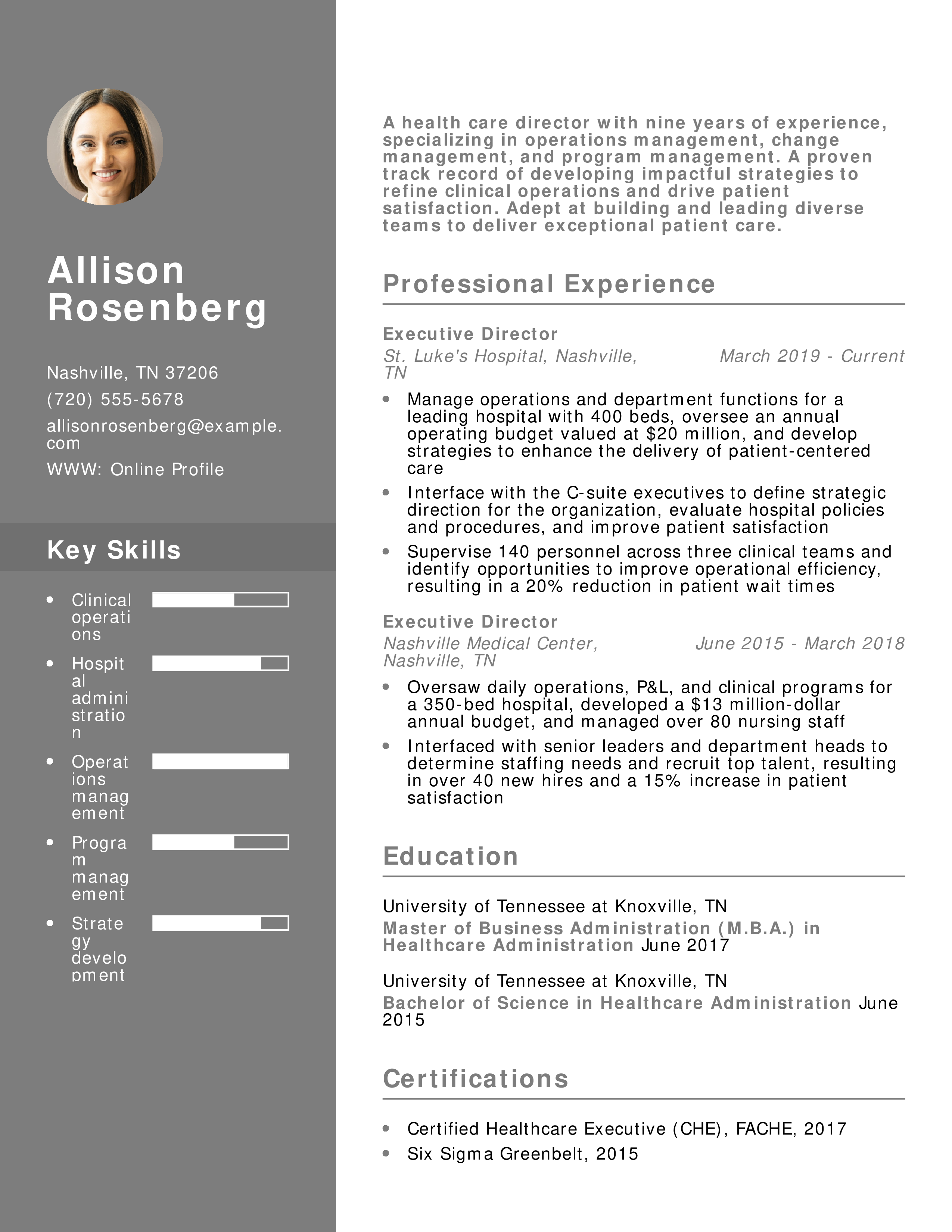
Why this resume is strong:
This resume showcases leadership in managing a $20 million budget while improving patient care and reducing wait times. It highlights collaboration with C-suite executives and driving operational efficiency.
HR Executive Resume
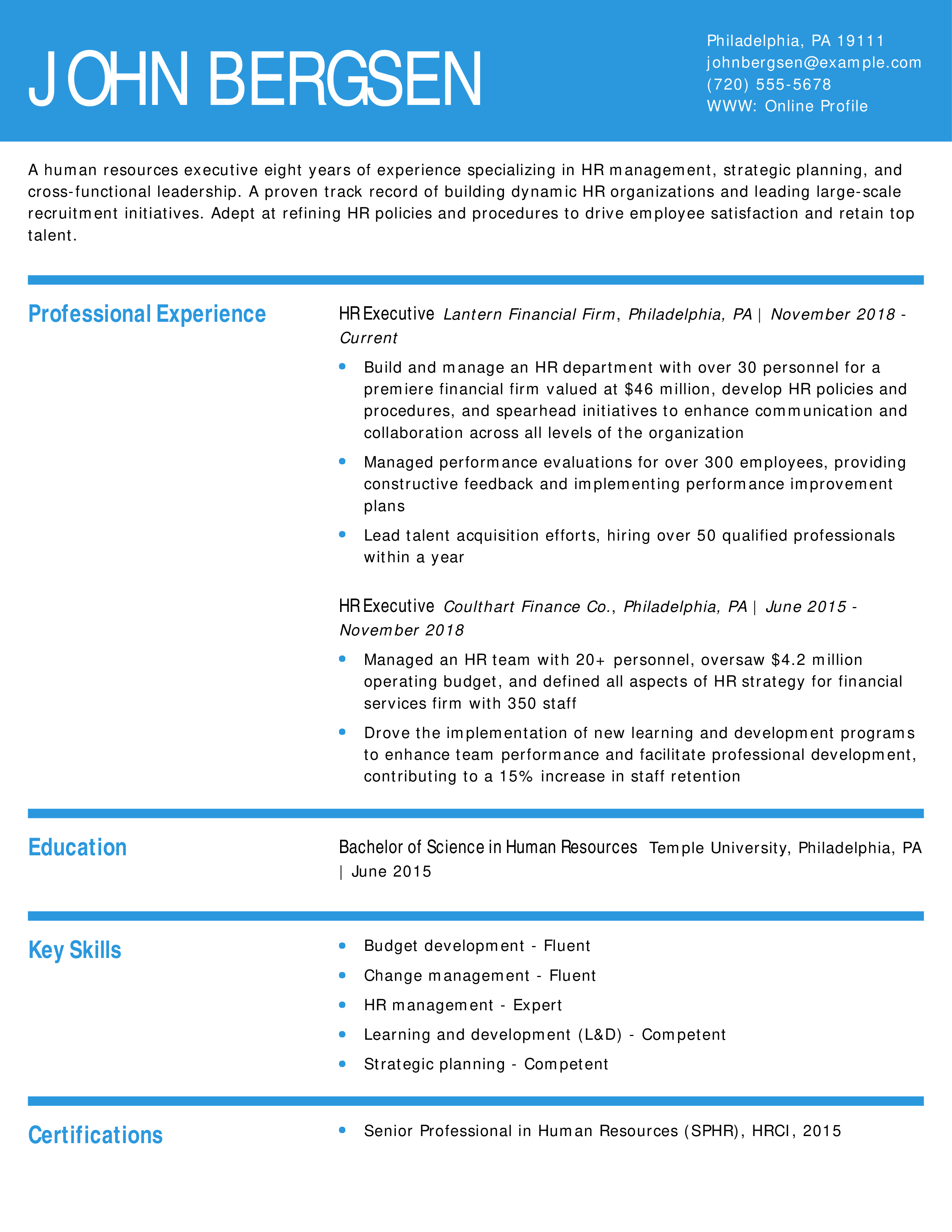
Why this resume is strong:
The resume highlights leadership in building HR departments and managing performance evaluations for over 300 employees. It also emphasizes success in talent acquisition and improving retention rates.
Nonprofit Executive Director Resume
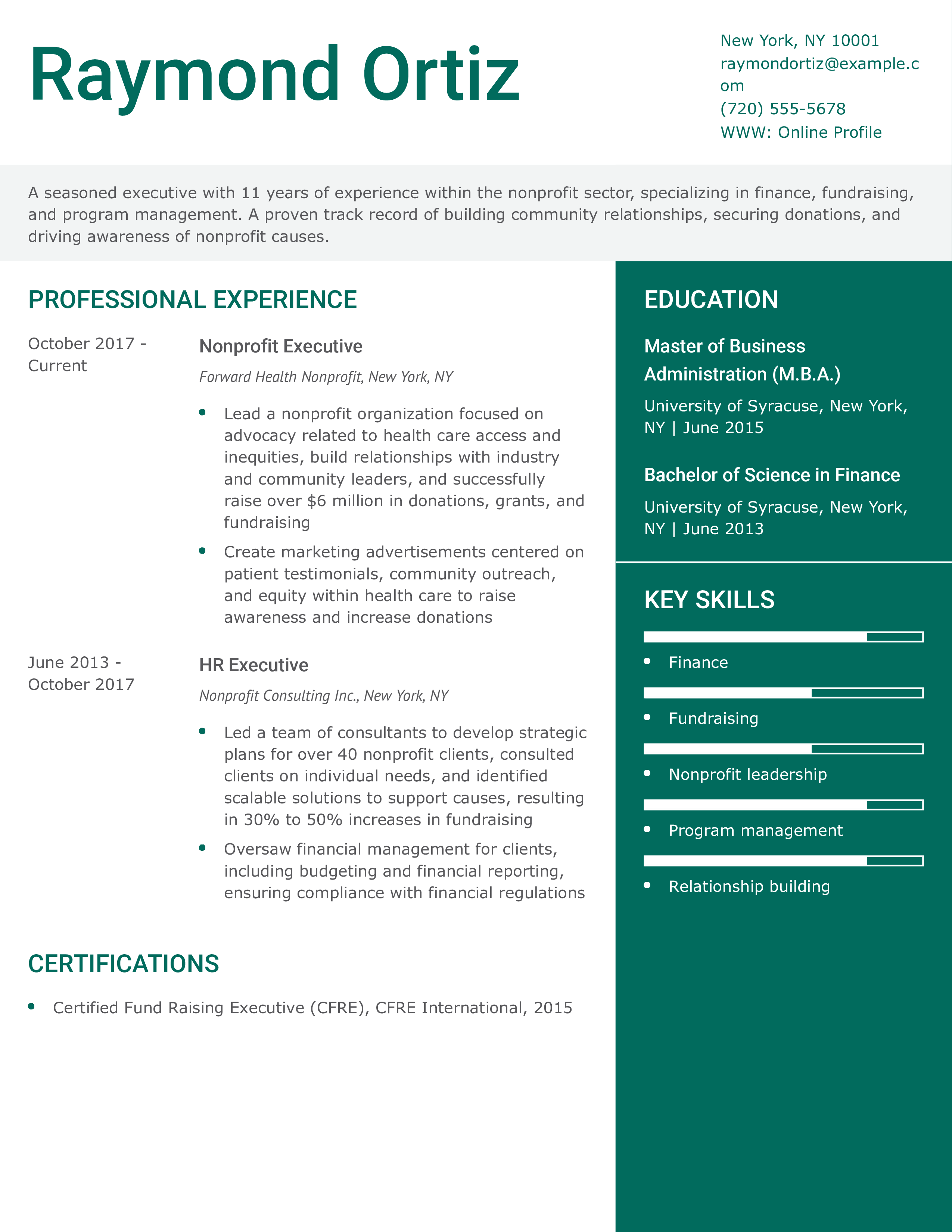
Why this resume is strong:
This resume demonstrates expertise in fundraising, securing $6 million in donations, and building community relationships. It highlights success in driving awareness for nonprofit causes and managing large-scale programs.
Senior Executive Resume
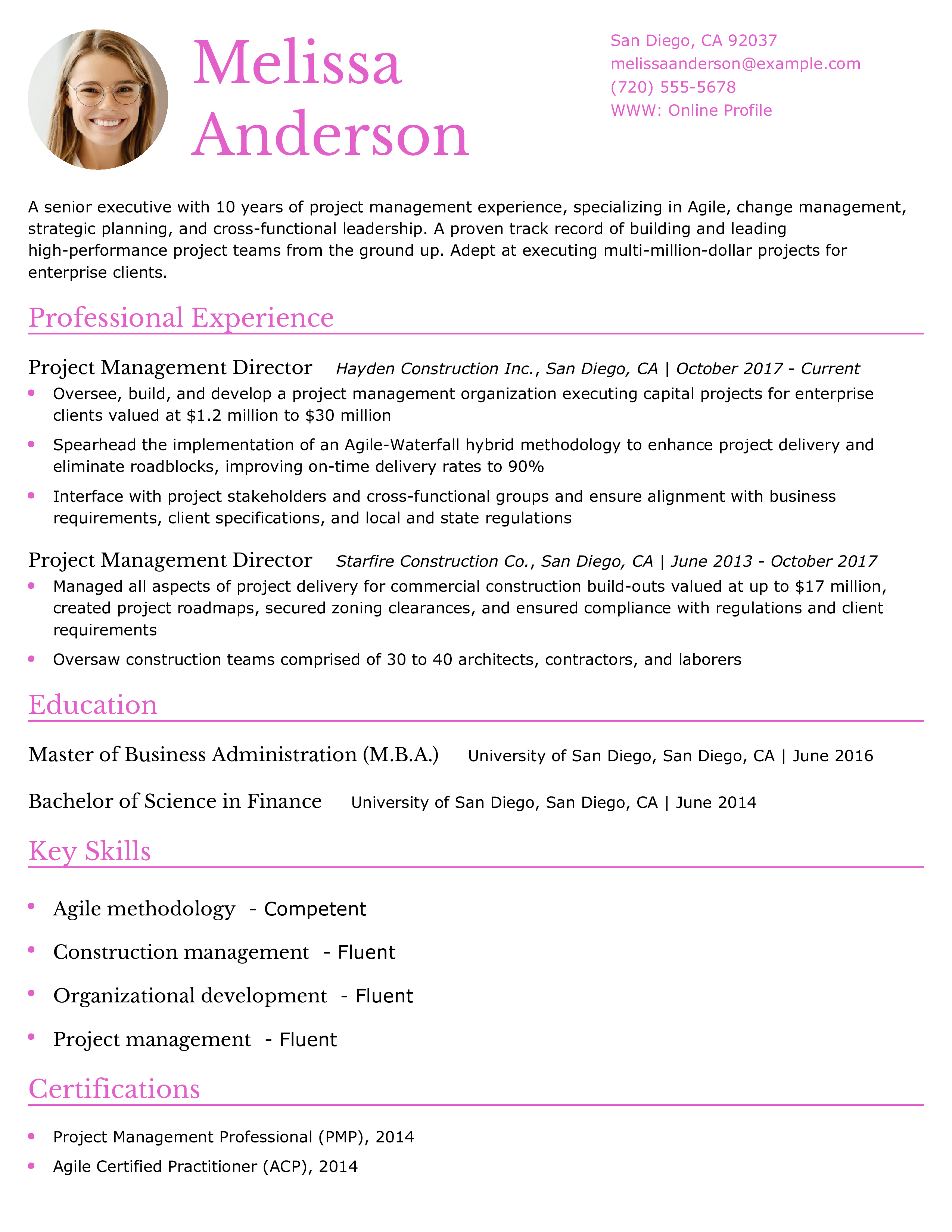
Why this resume is strong:
This resume showcases expertise in managing multi-million-dollar projects and implementing Agile methodologies to improve delivery rates. It emphasizes cross-functional leadership and project management success.
Executive Chef Resume
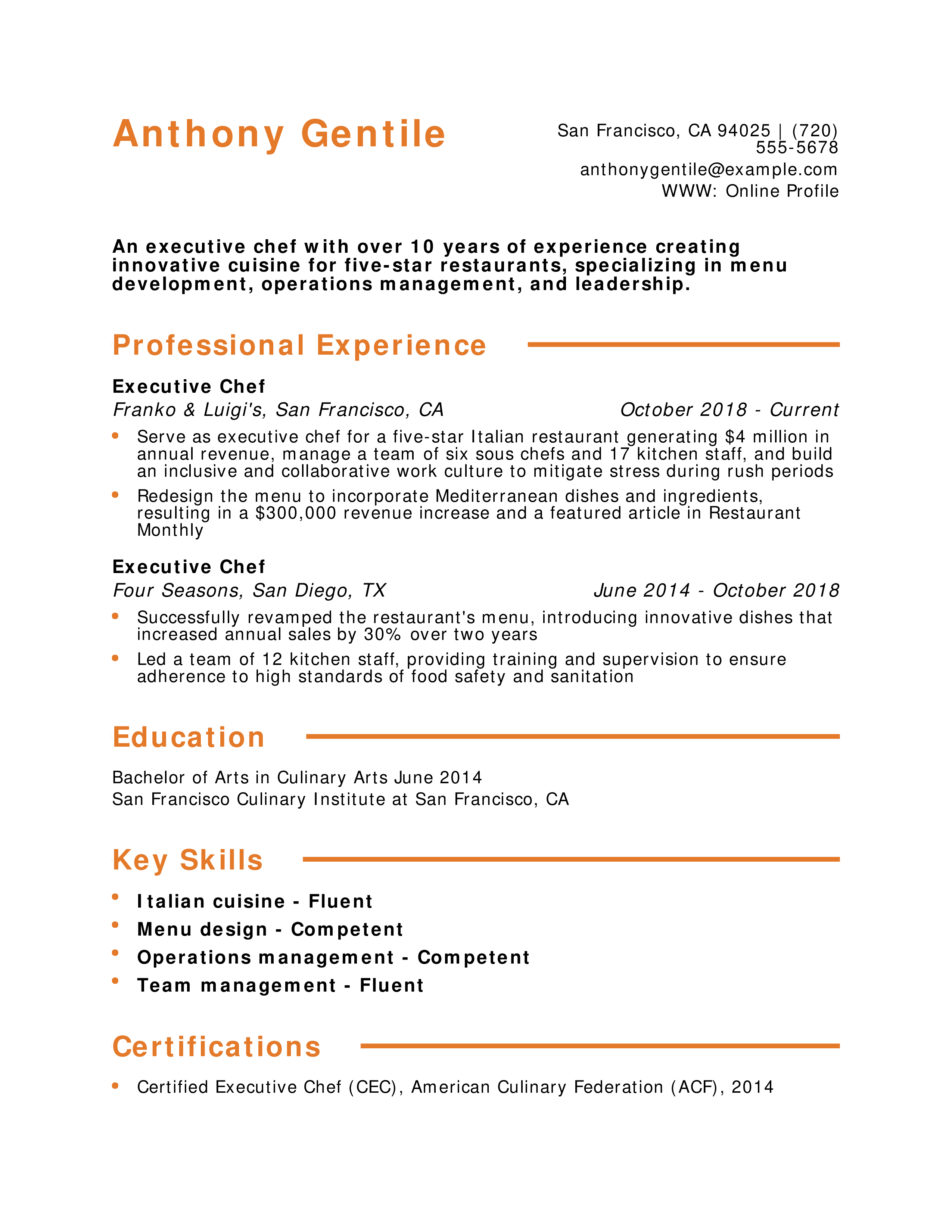
Why this resume is strong:
The resume highlights leadership in managing kitchen operations and redesigning menus to boost revenue by $300,000. It emphasizes team management, operations efficiency, and successful menu innovation.
Chief Marketing Officer Resume
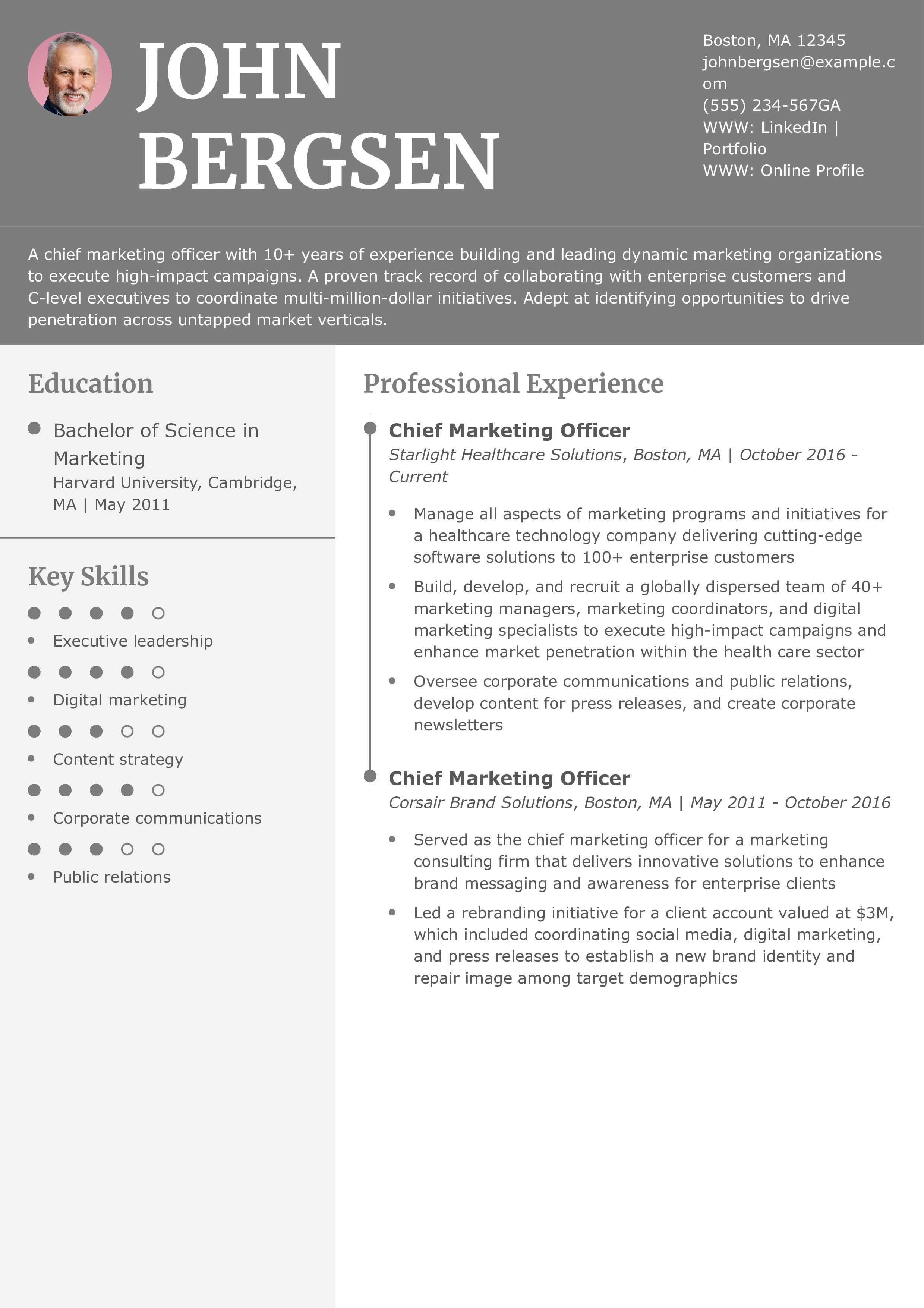
Chief Information Officer Resume
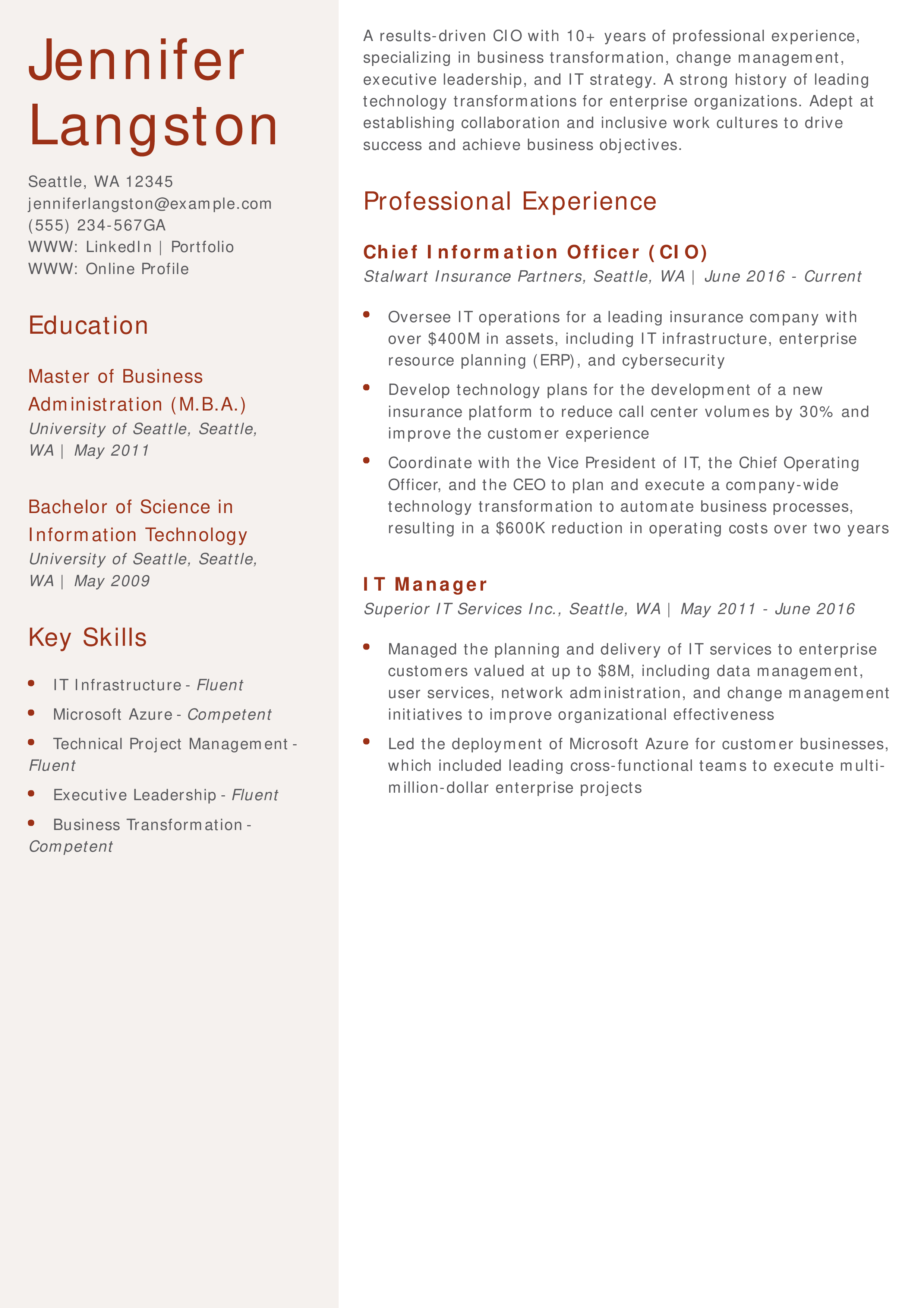
Chief Financial Officer Resume
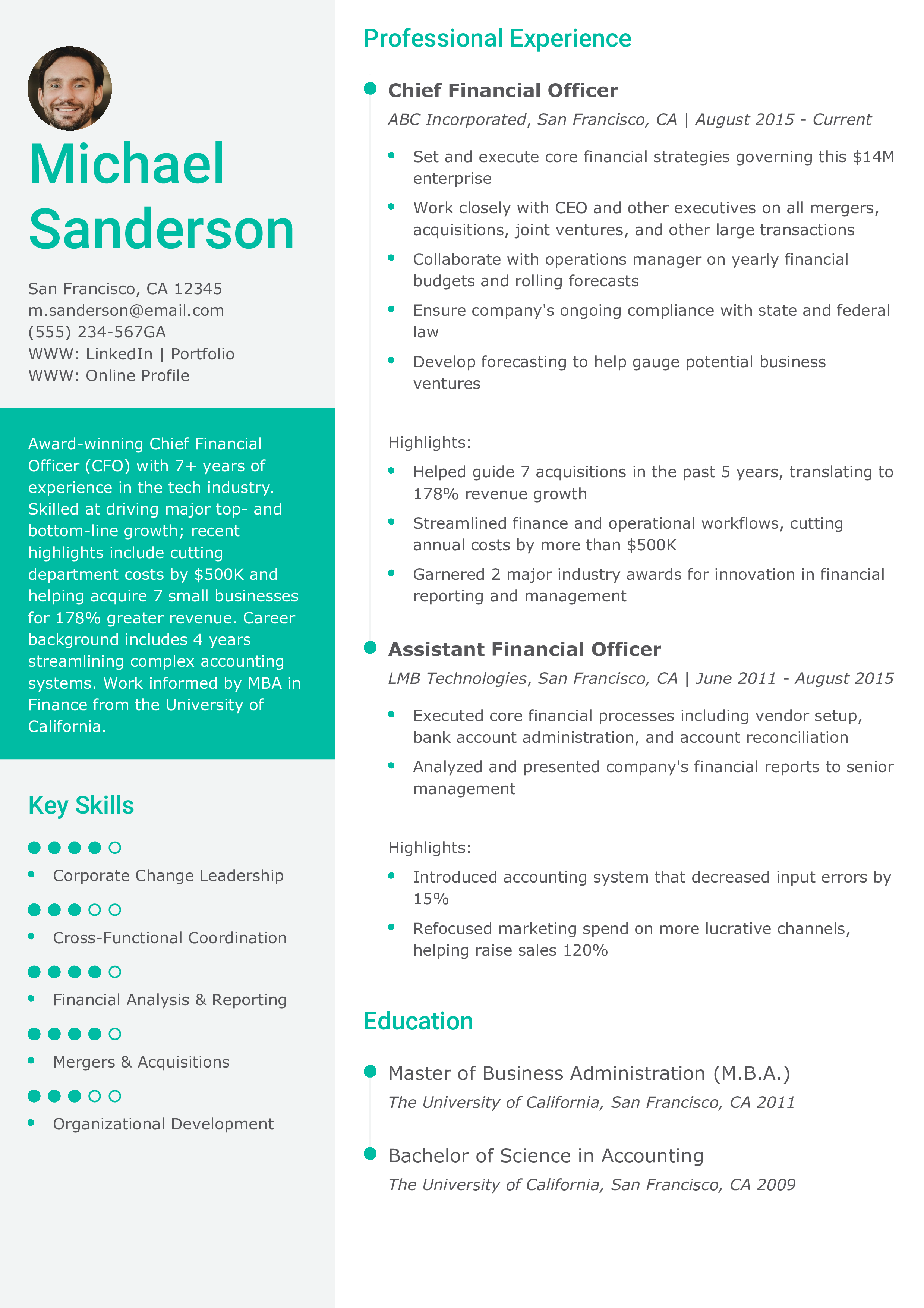
Chief Operating Officer Resume
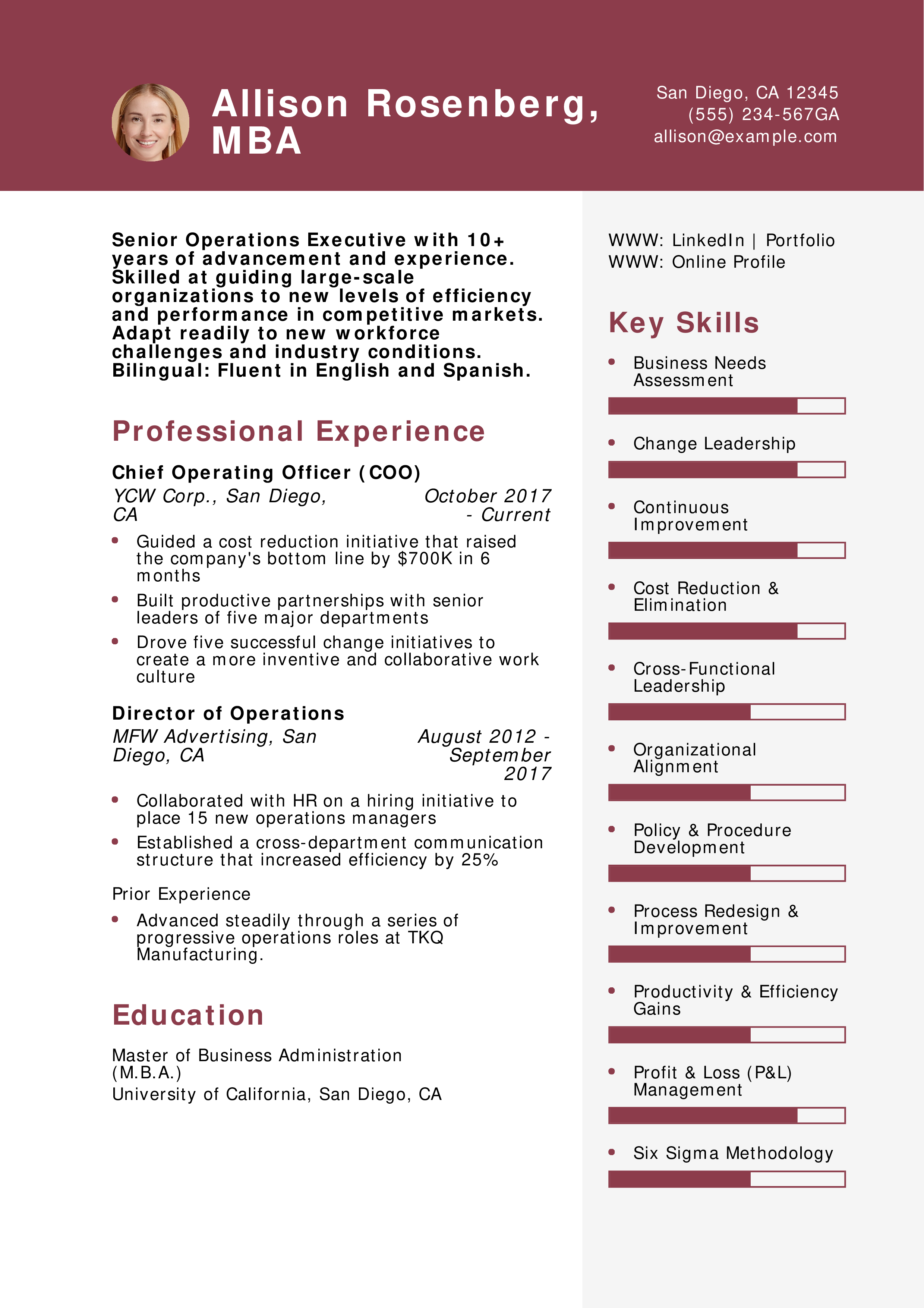
Chief Strategy Officer Resume
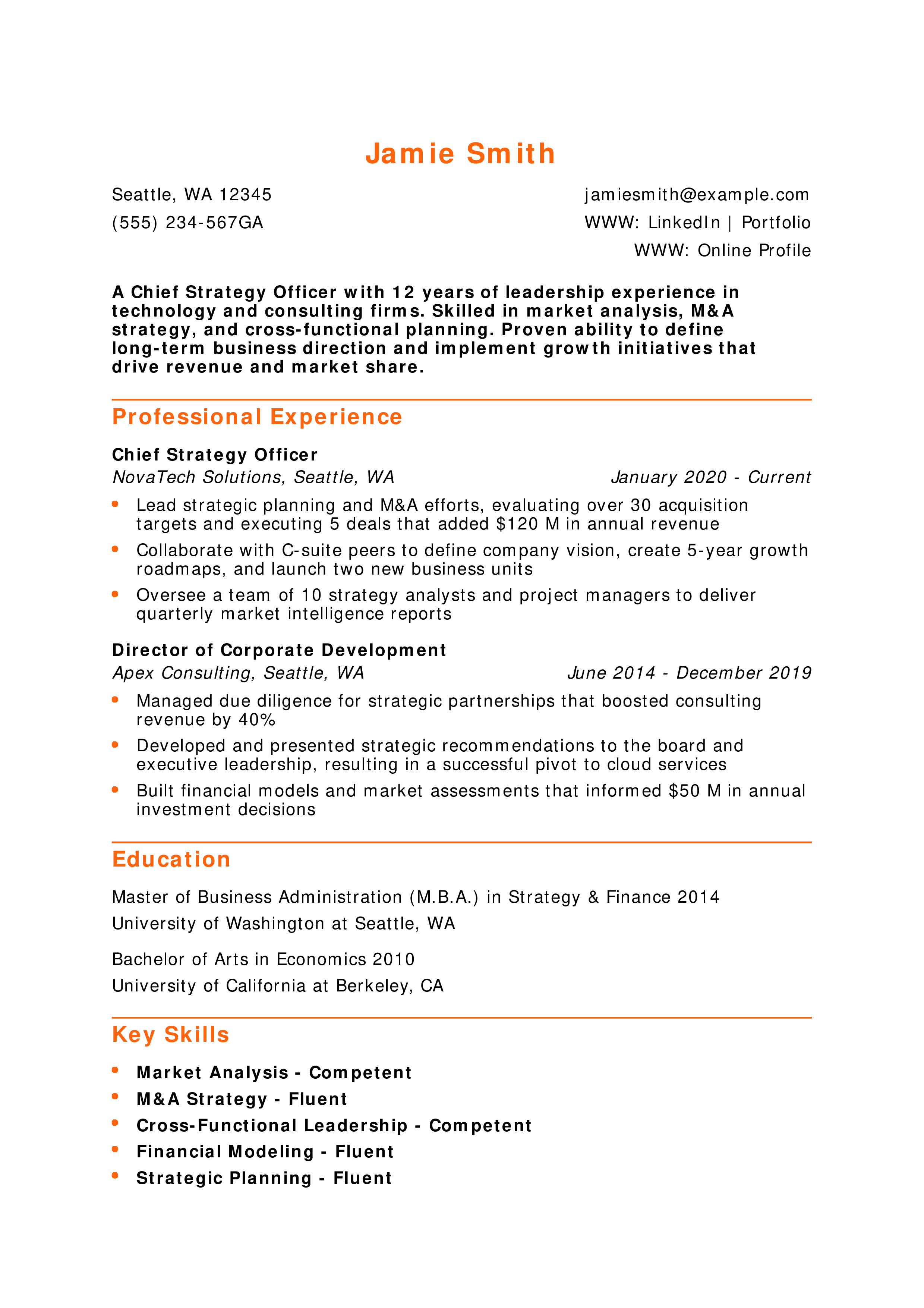
Why This Resume Is a Great Example
Jamie’s resume ties each accomplishment directly to financial impact, such as $120M in revenue, making the candidate’s strategic value immediately clear.
Key Tips
Focus on quantifiable outcomes to demonstrate impact beyond duties. For guidance on structuring your achievements, see Best Resume Formats.
Chief Product Officer Resume
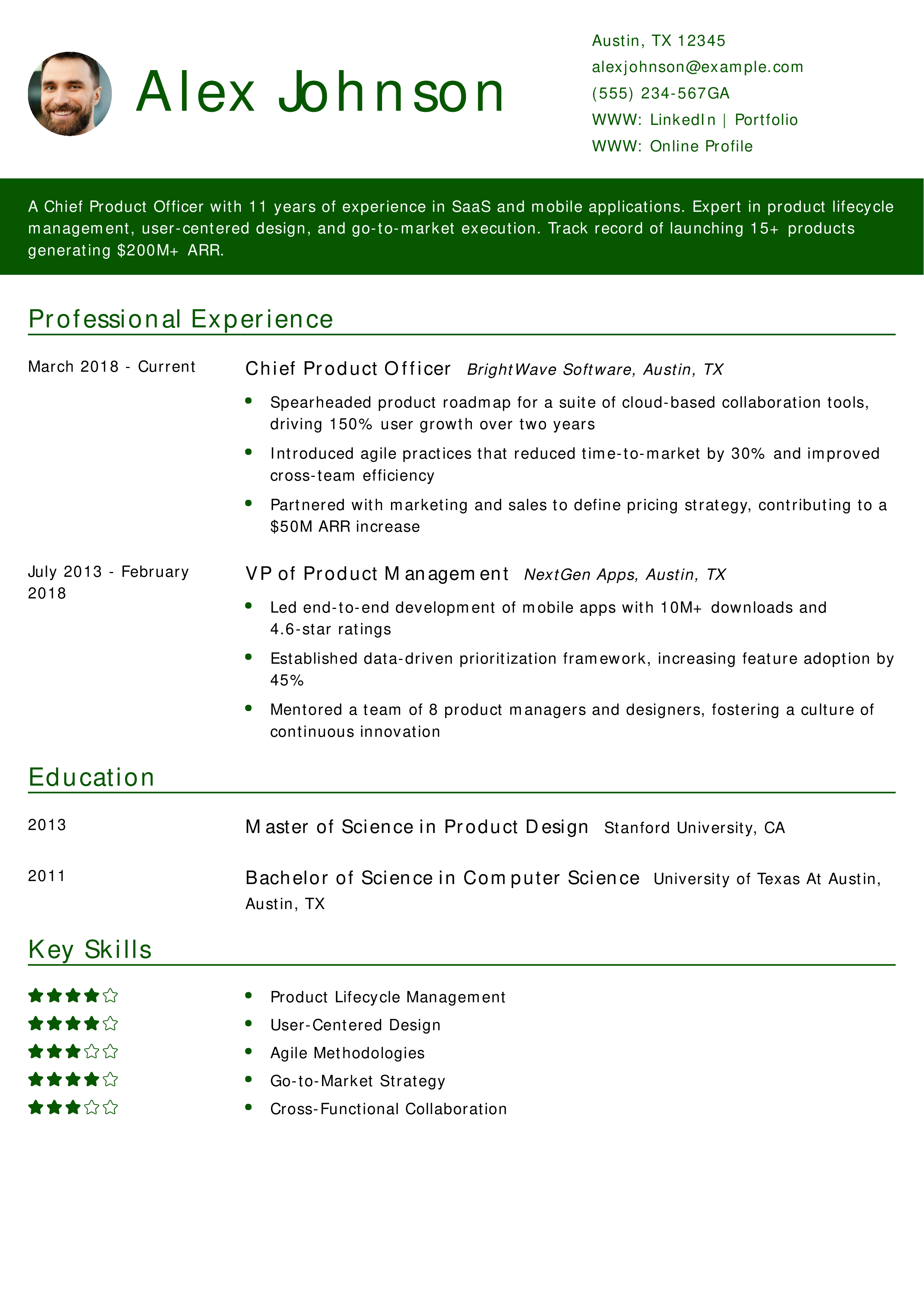
Why This Resume Is a Great Example
Alex’s resume showcases clear, high-impact metrics, such as 150% user growth and $50M ARR, in concise bullet points that prove product leadership.
Key Tips
Highlight actionable metrics alongside role descriptions to demonstrate concrete impact. Learn more about tailoring summaries in Resume Summary Examples.
Chief Data Officer Resume
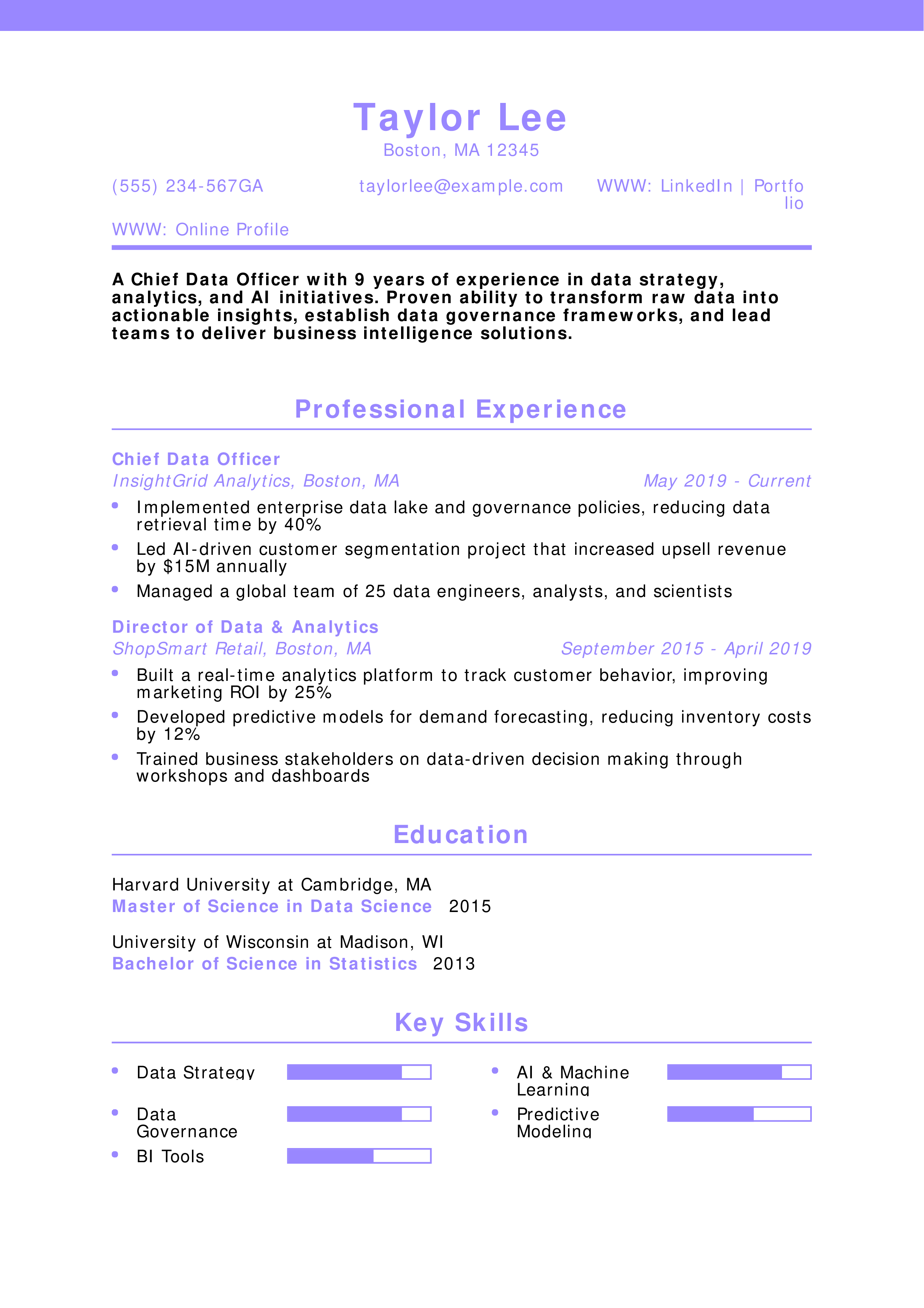
Why This Resume Is a Great Example
Taylor’s resume leads with compelling metrics, 40% faster data access and $15M in upsell revenue, showing the candidate’s direct business impact.
Key Tips
Use data points to quantify improvements and revenue impact for maximum clarity. For suggestions on highlighting technical expertise, check out Technical Skills for Resumes.
Chief Information Security Officer Resume
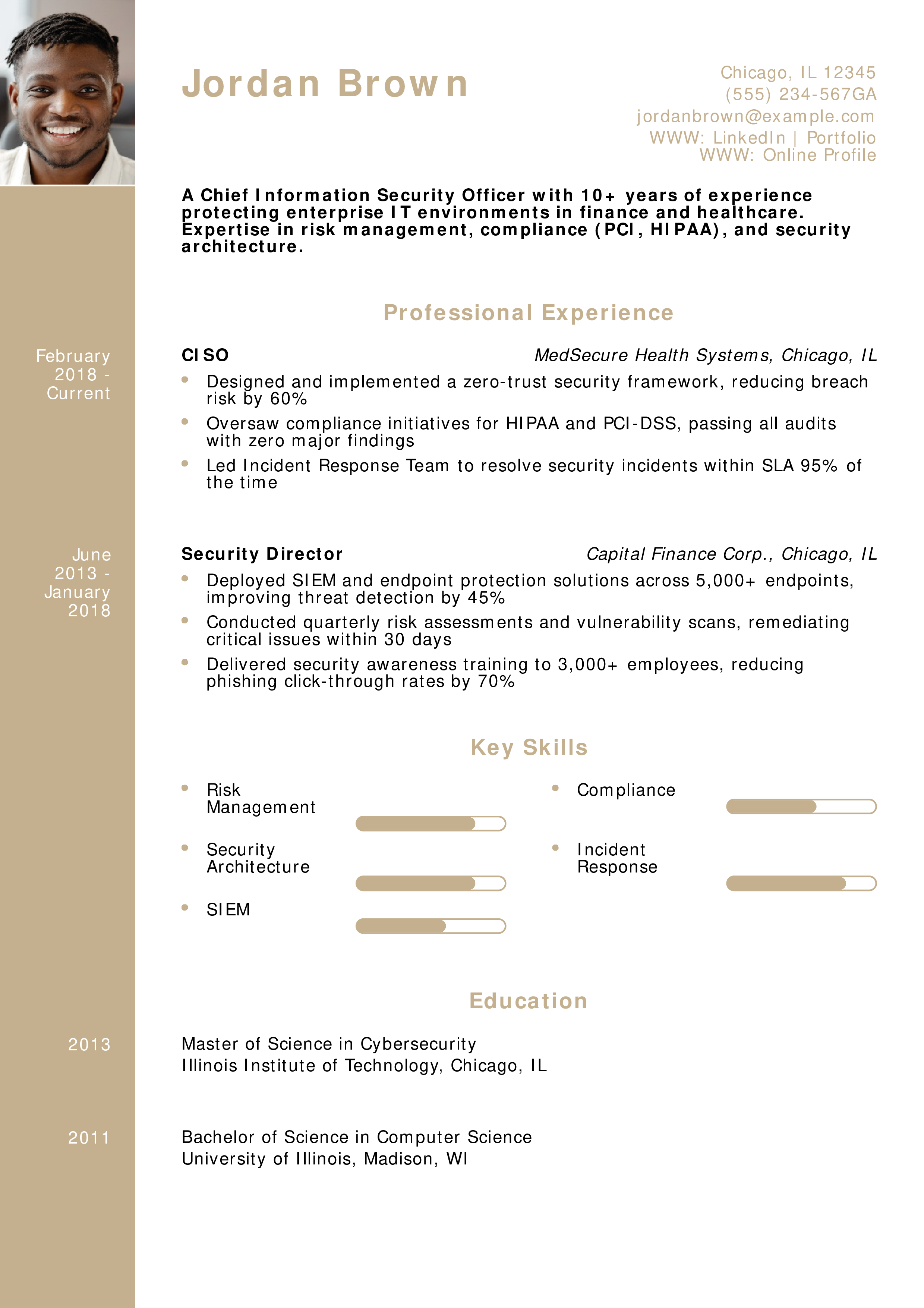
Why This Resume Is a Great Example
Jordan’s resume quantifies critical improvements, 60% risk reduction and 45% better threat detection, making the candidate’s value undeniable.
Key Tips
Emphasize compliance and risk-mitigation metrics to build trust with hiring stakeholders. Explore more on showcasing specialized skills in the Best Resume Skills.
Executive Vice President of Operations Resume
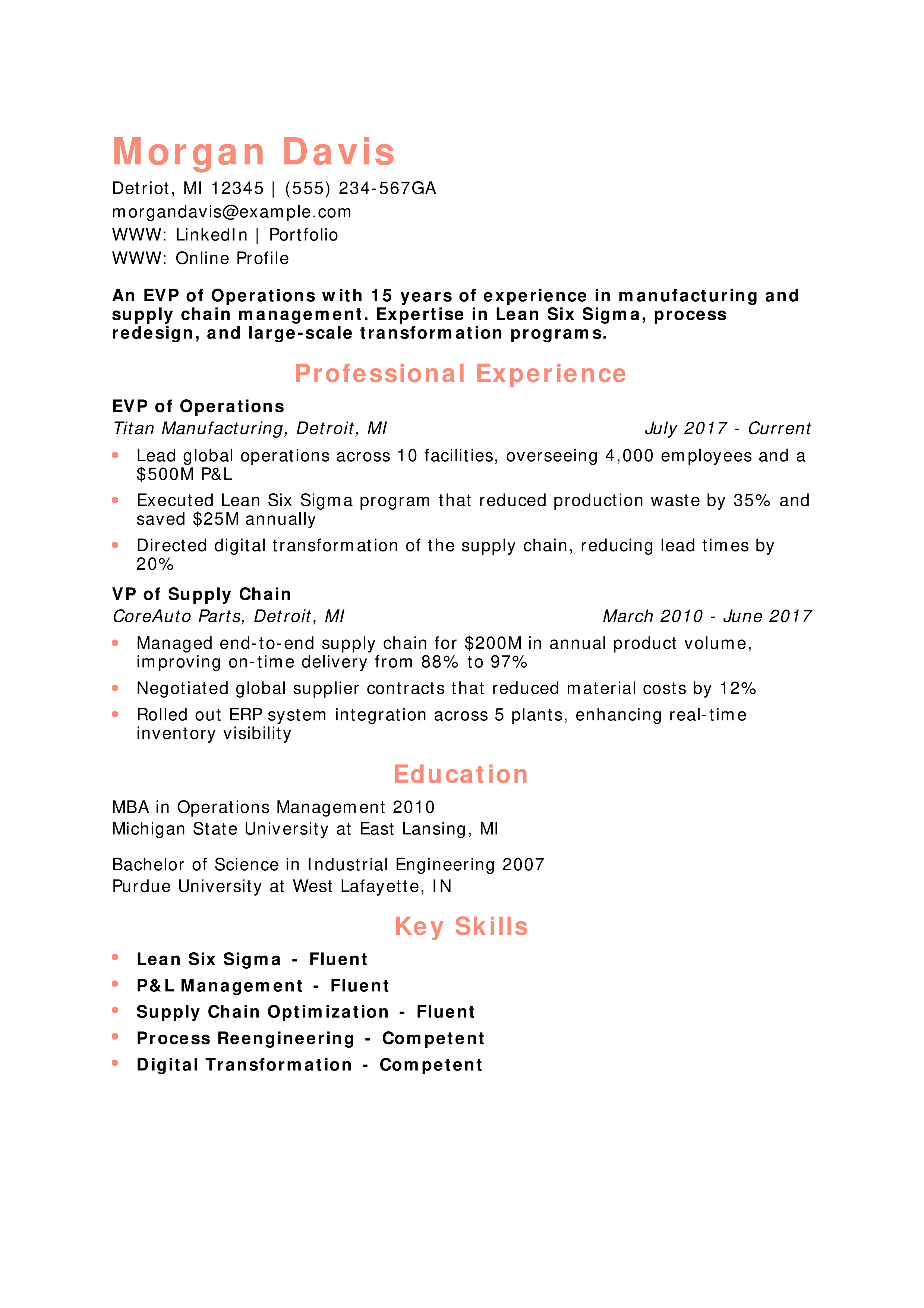
Why This Resume Is a Great Example
Morgan’s resume combines broad P&L responsibility with Lean-driven cost savings, 35% waste reduction and $25M in annual savings, demonstrating clear operational impact.
Key Tips
Highlight both scope (facilities, P&L size, etc) and savings metrics to convey scale and efficiency. For advice on structuring large achievements, see Best Resume Formats.
Executive Manager Resume
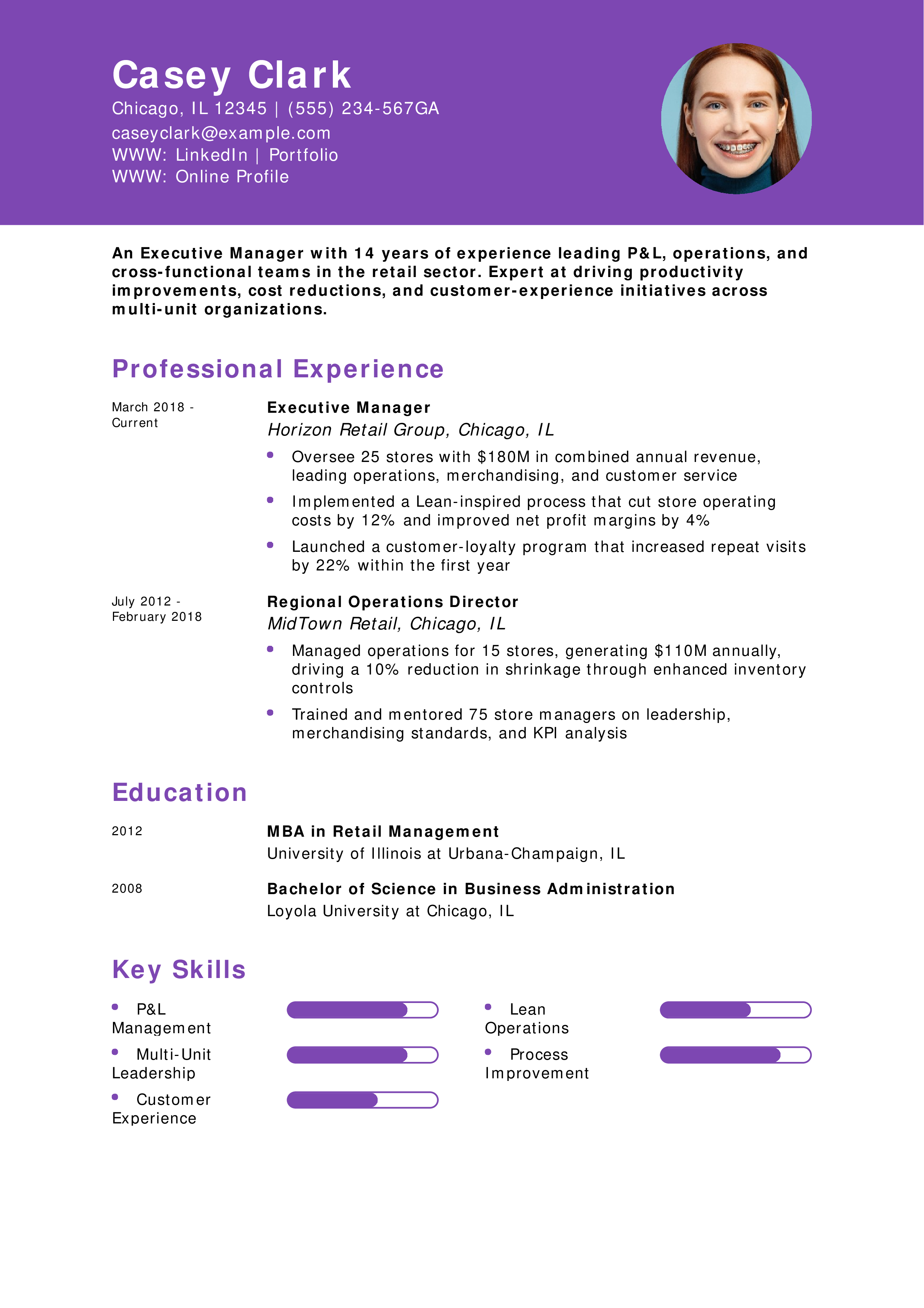
Why This Resume Is a Great Example
Casey’s resume ties the leadership of 25 stores directly to measurable improvements, such as a 12% cost reduction and 22% repeat-visit growth.
Key Tips
Lead with big-picture metrics to show enterprise-level impact. For insights on structuring executive accomplishments, see Should a Resume Be One Page?
Chief Legal Officer Resume
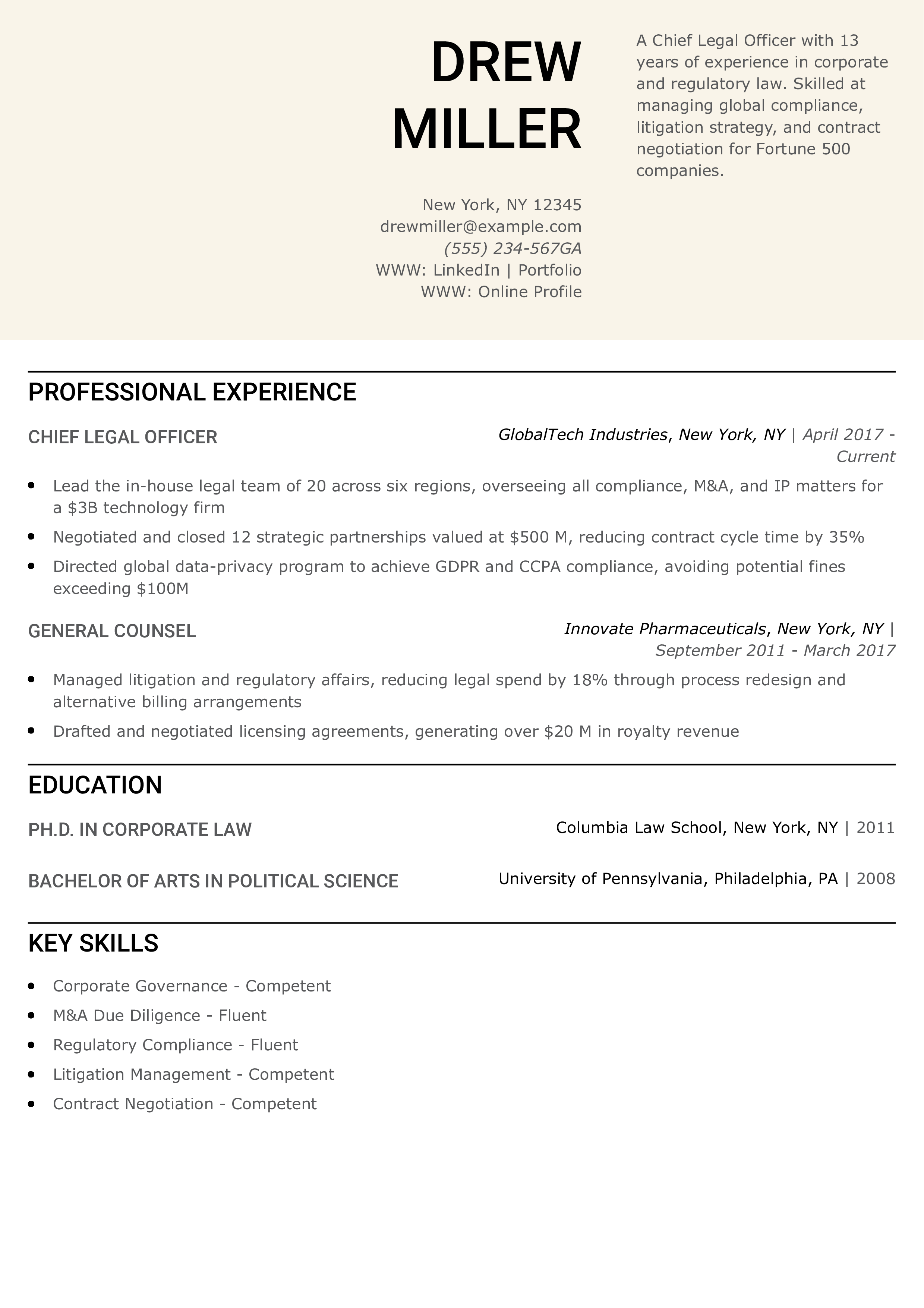
Why This Resume Is a Great Example
Drew’s resume quantifies legal leadership demonstrating both strategic and operational excellence.
Key Tips
Emphasize high-value transactions and compliance outcomes to build credibility. For best practices on highlighting certifications, see How to List Certifications on a Resume.
Nonprofit Executive Director Resume

Why This Resume Is a Great Example
Chris’s resume pairs growth metrics, like 300% budget increase and 10,000 beneficiaries, with clear leadership in program design and volunteer scaling.
Key Tips
Show both financial growth and programmatic impact to highlight holistic leadership. For tips on structuring nonprofit achievements, see How to Make a Resume.
Sales Director Resume
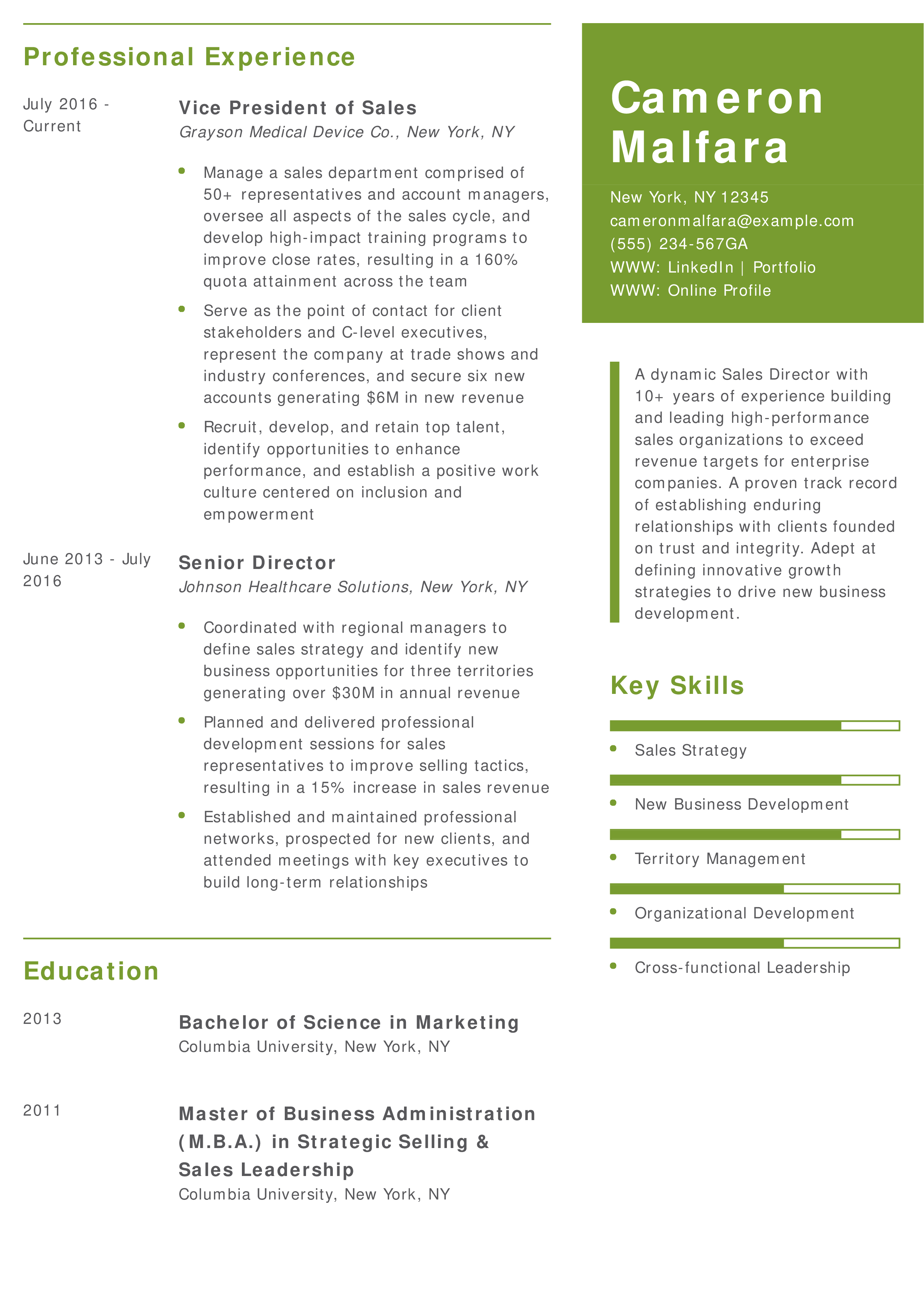
Chief Growth Officer Resume Example
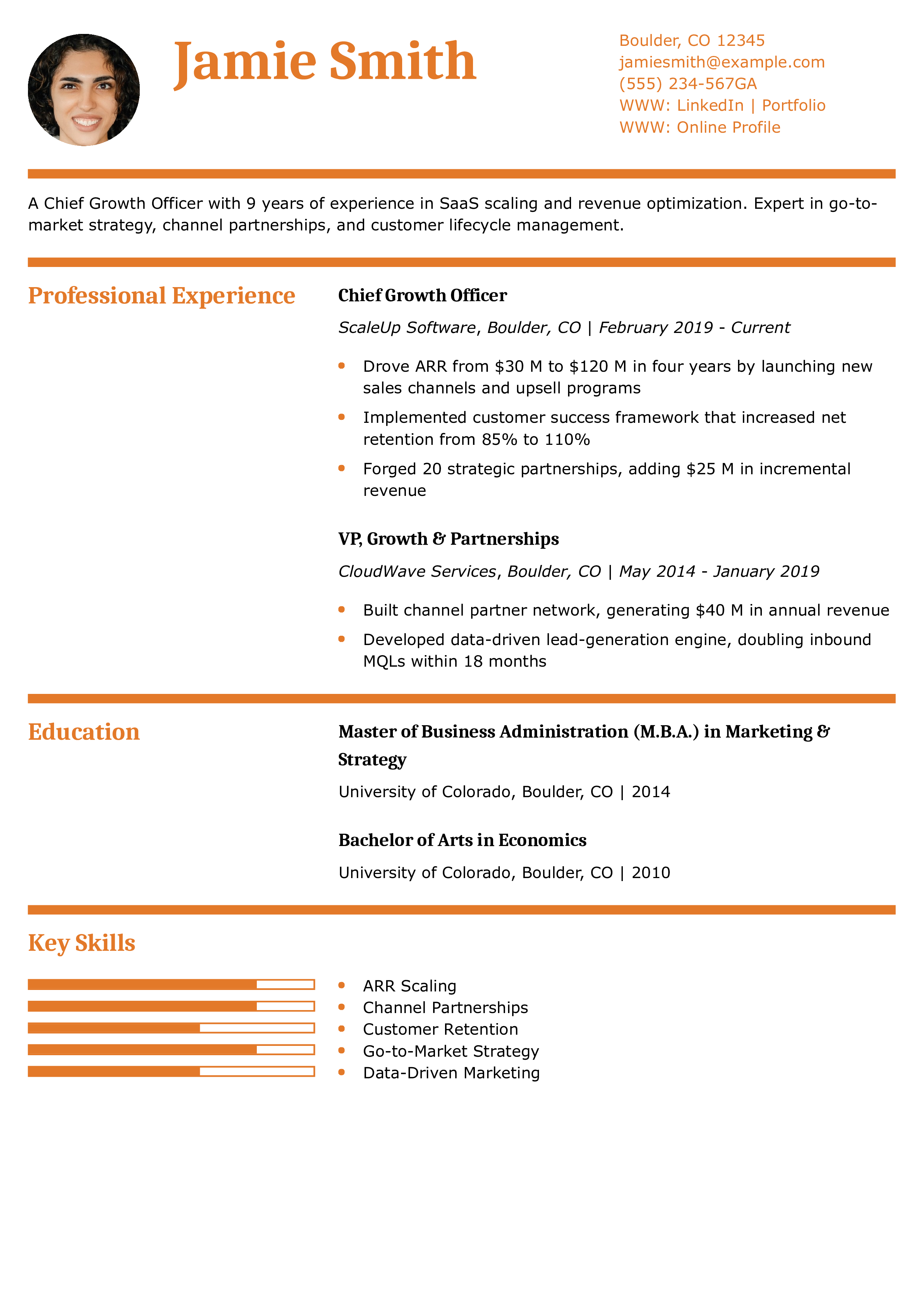
Why This Resume Is a Great Example
Jamie’s resume quantifies explosive growth, like quadrupling ARR and boosting net retention, proving hands-on revenue leadership.
Key Tips
Highlight key metrics like ARR growth and retention to showcase revenue impact. For more on showcasing growth metrics, see What to Put on a Resume.
Executive Manager, Corporate Affairs Resume
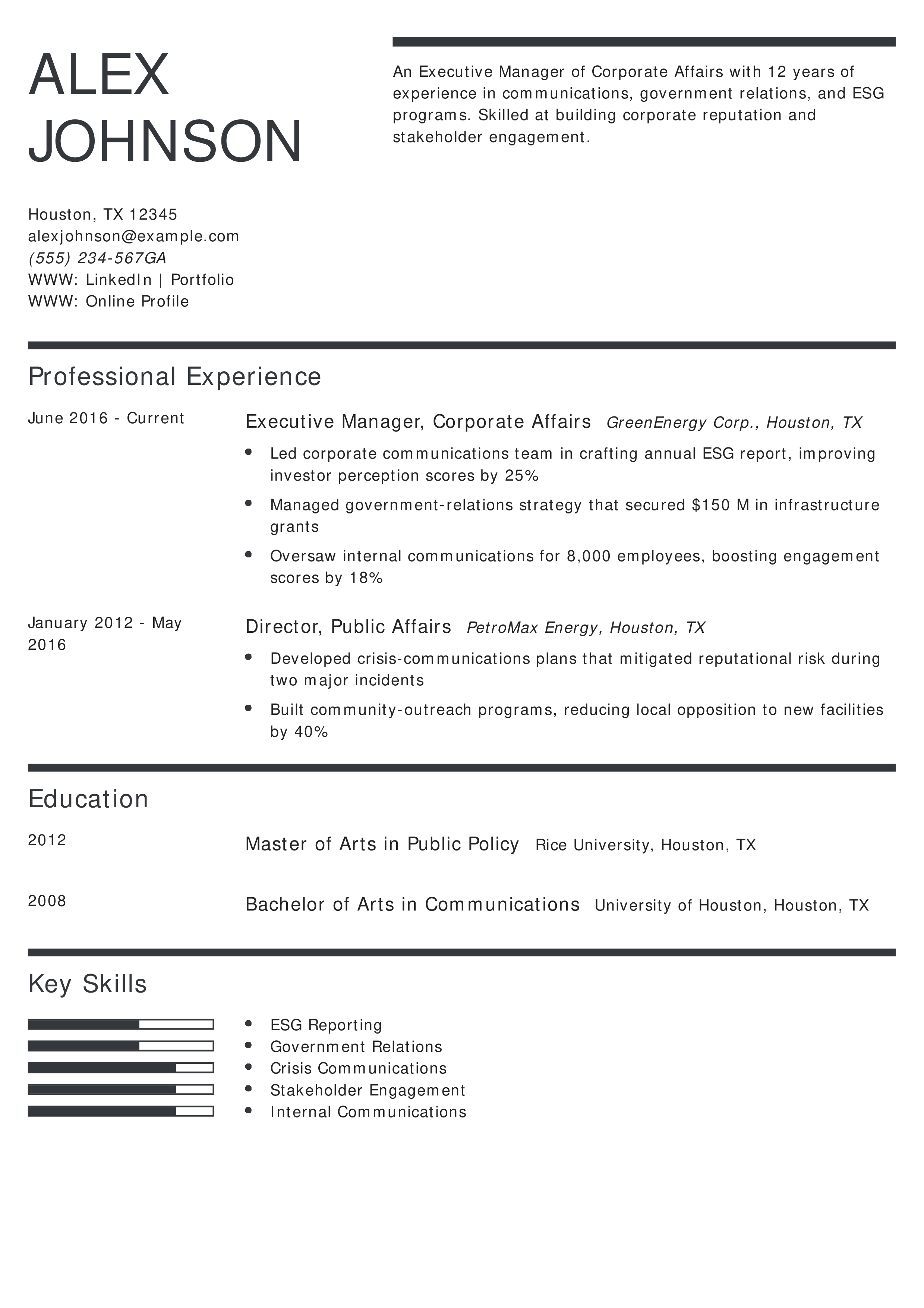
Why This Resume Is a Great Example
Alex’s resume pairs tangible outcomes, like 25% higher perception scores and $150M in grants, with strategic communication achievements.
Key Tips
Combine communication metrics and funding wins for a compelling narrative. For guidance on listing publications or reports, see How to List Publications on a Resume or CV.
Our templates are crafted by professional resume writers to make creating your resume quick, easy, and effective.
- Professional resume template downloads
- Customized cover letter generation
- AI resume writing support
- Career-building resources and advice
Executive Text-Only Resume Templates and Examples
How To Write an Executive Resume
1. Write a dynamic profile summarizing your executive qualifications
Your opening summary is a key aspect of the resume. The goal is to create an engaging snapshot of your career to establish your personal brand and draw the reader in. As an executive, focus on presenting yourself as a thought leader within your industry. For example, if you worked primarily with Fortune 500 companies in the technology industry, highlight this in your first two sentences. If you’ve cultivated global leadership experience, mention it in your profile. Seek balance in telling your unique story while highlighting qualifications that match the position you’re applying for.
Professional Profile - Example #1
Profile
A vice president with over 10 years of experience within the banking industry, specializing in financial analysis, investment strategy, marketing, and regulatory compliance. A proven track record of building relationships with enterprise customers and identifying opportunities to enhance the growth of client portfolios.
Professional Profile - Example #2
Profile
A technology executive with over 10 years of experience specializing in product innovation, business development, and go-to-market strategy. A proven track record of developing business strategies to drive revenue growth and expand market share. A strong history of engaging with C-level executives and investors to define product strategy.
2. Add your executive experience with compelling examples
As an executive, provide tangible examples of your high-level responsibilities, such as defining strategic direction for organizations and interfacing with C-level executives. Hard numbers and data can also help bolster the impact of your bullet points, but not every contribution is easily quantified. For instance, if you worked to establish a forward-thinking and inclusive work culture, this is worth demonstrating even if it can’t be measured with a monetary figure or percentage. Showcase industry-specific projects and accomplishments while also capturing your leadership experience.
Professional Experience - Example #1
Professional Experience
Vice President, Trust Bank, Philadelphia, PA
October 2016 – present
- Oversee all aspects of client relationships for over 15 accounts valued at $20 million, expand revenue opportunities, conduct due diligence, and run client implementations to generate an additional $1.2 million in annual revenue
- Lead projects for client initiatives, serve as a liaison between client and business units to ensure successful implementation and manage stakeholder expectations
- Coordinate cross-functionally with legal, enterprise risk, and compliance teams to mitigate financial risks and ensure regulatory compliance
Professional Experience - Example #2
Professional Experience
Vice President, Excelsior Technologies, San Francisco, CA
October 2016 – present
- Oversee a team of five directors with over 300 direct reports, define strategic direction for the business unit, manage profit and loss (P&L) valued at $50 million, and establish a forward-thinking work culture centered on innovation, collaboration, and inclusion
- Develop high-impact go-to-market strategy to expand customer acquisition across digital platforms, contributing to a $10 million increase in revenue across five product lines
- Interface with C-level executives, senior management, and investors to assess market trends, define product messaging, and expand reach across untapped verticals
3. List any education and certifications relevant to executives
In addition to your education, incorporate industry certifications to demonstrate your knowledge and expertise within your field. Leadership credentials are also valuable for executives, specifically if they pertain to change management and organizational development.
As an executive, prospective employers will often expect more credentials due to your years of experience within your industry.
Education
Template
- [Degree Name]
- [School Name], [City, State Abbreviation] [Dates Enrolled]
Example
- Master of Business Administration (M.B.A.) Product Management
- University of San Francisco, San Francisco, CA September 2011 – June 2013
Certifications
Template
- [Certification Name], [Awarding Organization], [Completion Year]
Example
- Certified Technical Product Manager, PMHQ, 2015
- Certified Product Manager (CPM), AIPMM, 2013
4. Include a list of skills and proficiencies related to executives
Organizations utilize Applicant Tracking Systems (ATS) to identify qualified candidates for job openings, even at the executive level. If your resume lacks a certain number of key terms from the job description, you may be rejected at the onset of the application process. Poor targeting might also fail to impress the hiring manager, even if your resume does advance to the next phase. As you build your resume, incorporate key skills and qualifications directly from the posting using tangible examples from your career. Below, you’ll find a wide range of potential keywords you may encounter during the job search:
| Key Skills and Proficiencies | |
|---|---|
| Business development | Change management |
| Client relations | Cross-functional leadership |
| C-Suite | Data-driven decision-making |
| Executive leadership | Health care management |
| Organizational development | Product management |
| Program management | Project management |
| Sales leadership | Stakeholder management |
| Strategic planning | Strategy development |
| Talent acquisition | Technical project management |
How To Pick the Best Executive Resume Template
When selecting a template for executive-level positions, choose an option that fits your personal brand without obscuring your content. Be thoughtful in your usage of color and graphics. Despite the visual appeal, this can often have the opposite effect of what you’re hoping for. When in doubt, select a well-organized, straightforward template that keeps the reader’s focus firmly on your career achievements and qualifications.

Joe Battinieri - Senior Talent Acquisition Professional, LinkedIn
Meet our Expert: Joe has over 20 years of experience in recruiting and human resources. His background includes in-house and consulting recruiting roles. He has executive search and talent acquisition leadership expertise in a variety of industries and is currently focused on sales, marketing, client services, and product roles.
1. What are the most in-demand skills for executives that should be featured on a candidate’s resume?-
The most important and in-demand skill for an executive is emotional intelligence. This is the understanding and managing one's own emotions and the emotions of others. Important for leading a team, effective collaboration, and conflict resolution, it builds a positive workplace culture. It creates credibility, communicates ideas, builds relationships, and addresses stakeholders, board members, and team members. Other in-demand skills include strategic planning, the ability to zoom in and out, industry knowledge, and budget management.
2. What work experience and other accomplishments are hiring managers looking for in an executive?-
Hiring managers want executives with a strategic vision, growth mindset, and operational excellence. Depending on the role, a successful executive will have experience with increasing revenue, reducing software development cycles and errors, delivering new products to market, and increasing customer retention. All of these experiences demonstrate a leader’s success in supporting a company’s strategic growth — critical for an executive’s success.
3. What else, in addition to a resume, should an executive candidate be prepared to provide hiring managers?-
Executives should also have a cover letter that strongly aligns with the role they are applying for. They should be ready to share any executive presentations, speaker engagements/TED talk videos, publications, or articles that highlight their expertise.
4. What advice would you give an executive candidate about their job search? -
Your network is critical to your job search. Executives should leverage industry contacts and current and former colleagues. These people know you best and can speak to your abilities. They may also be able to help the candidate vet a company. External recruiters that either placed the executive or people on their team should also be included in your job search.
Interview advice: Executives are hired for their people leadership and expertise in a specific function. Be prepared to highlight your ability to be strategic and share the data that supports your story for both.
Frequently Asked Questions: Executive Resume Examples and Advice
Why should I use an Executive resume example as a template for my own resume?-
An Executive resume example provides a solid foundation for structuring your own resume. It showcases how to highlight achievements, use quantifiable metrics, and present your experience in an organized manner. You can personalize it by adding your unique qualifications and adjusting sections to better reflect your skills and career history.
What are common action verbs for executive resumes?-
It’s easy to run out of action verbs during the resume-building process. Often a limited number of words convey your career achievements and experience accurately. Utilizing an array of action verbs is important, as repetition may cause your bullet points to appear redundant to the hiring manager. We’ve compiled a list of verbs to craft your professional experience section:
| Action Verbs | |
|---|---|
| Built | Collaborated |
| Coordinated | Created |
| Developed | Drove |
| Enhanced | Evaluated |
| Executed | Generated |
| Identified | Implemented |
| Improved | Increased |
| Led | Managed |
| Optimized | Oversaw |
| Partnered | Spearheaded |
How do you align your resume with a job description?-
According to the Bureau of Labor Statistics, jobs for top executives are expected to grow by 6% between 2021 and 2031. This equates to over 180,000 new openings each year. Despite the high number of opportunities on the open market, executive-level roles are highly competitive, and you’ll need to carefully align your resume with each individual job description.
For example, if you’re applying for a VP-level position at a data science company, you’d demonstrate your thought leadership experience with machine learning products. If you’re applying for an executive role that requires an extensive background in stakeholder management, showcase examples of your interfacing with C-level executives.
Aligning your resume with the job description will give you a tactical advantage over the competition during the job search.
What is the best executive resume format?-
Reverse chronological is the ideal format for job seekers at the executive level. This ensures that your most recent and impactful achievements are featured at the top of your document. Functional resumes should be avoided here, even if you plan on making a career transition, as you’ll be expected to provide tangible examples of your experience when applying for executive roles.
How long should my executive resume be?-
An executive resume should typically be one page long, especially if you have less than 10 years of experience. A two-page resume may be appropriate for seasoned professionals with extensive achievements, but only if every detail adds value to your candidacy. Focus on conciseness and relevance by tailoring your resume to the job you're applying for. Highlight your most impactful accomplishments, certifications, and key skills rather than listing every career detail.
Including work experience from the last 10 to 15 years is generally recommended. Older positions can be summarized briefly or omitted unless highly relevant. Remember, your resume is a snapshot of your qualifications, not an exhaustive career history. Prioritize clarity and impact to make a strong impression.
Craft your perfect resume in minutes
Get 2x more interviews with Resume Builder. Access Pro Plan features for a limited time!

Cover letters are often required when applying for executive positions. Prospective employers want to better understand your industry expertise and determine whether you’re the right cultural fit for their organization. In your middle paragraphs, mention something specific about the company’s mission statement, reputation, or culture and how it aligns with your professional background. For more information, visit our executive cover letter guide.




